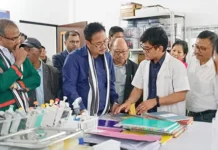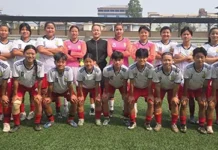[ Marpek Riram ]
Crimes against children in Arunachal Pradesh are rising, especially in boarding schools. There are reports of sexual abuse, harassment by wardens and senior students, and even unnatural deaths. This is a serious warning for all of us.
Parents send their children to boarding schools with trust. They hope their children will get good education, discipline and a peaceful study environment. Many parents work long hours to pay school and hostel fees. When a child is abused or dies inside a campus, that trust is broken in a very cruel way.
Many cases of sexual abuse may never be reported. Even when cases are reported, in most incidents, no clear responsibility is fixed on the school management. Often, the only visible action is a simple awareness session on good touch and bad touch. This is not enough.
If we want real change, we must create a strong system to prevent abuse, detect it early and punish the perpetrator(s) quickly. For this, a three-tier model of monitoring boarding schools can be adopted for the safety and security of wards in boarding hostel.
- A special board should be formed at the state level to approve any school that wants to run a hostel. No school should be allowed to open or expand a boarding facility without clearance from this board.
The board should carefully check the following points before granting permission:
- Structural safety of hostel buildings.
- Fire safety, exits, lighting and drinking water.
- Separate and secure hostels for boys and girls,
- Clean toilets and bathing areas with privacy, and
- Safe sleeping arrangements with proper ventilation.
The board should also frame clear rules for recruitment of teaching and non-teaching staffers in hostels. There should be mandatory police verification for wardens, helpers and security staff; minimum educational qualifications and age criteria; and training on child protection, gender sensitivity and basic first aid.
The board should have the power to cancel hostel permission if a school fails to meet safety and child protection standards.
- At the district level, there should be a permanent monitoring team for all boarding schools. This team should include the deputy commissioner as chairperson, besides the deputy director of school education, the child development project officer, the SP, and selected parents of primary, middle and senior level students as members.
This team should make scheduled visits to schools and hostels at least twice a year. They should check compliance with safety and recruitment norms; functioning of complaint systems for students; record of past incidents and actions taken; presence of female wardens in girls’ hostels; night duty arrangements and security at gates.
Their report should become part of school performance evaluation. If a school repeatedly fails to protect children, its licence or permit to run a hostel should be suspended or cancelled.
- In addition to planned inspection, a flying squad should be formed for surprise visits. This squad may include a health worker not below the rank of medical officer; a police officer not below the rank of sub-inspector; and an officer from the Child Development Department.
The flying squad should visit hostels without prior notice; speak with students privately, in small groups and individually; look for signs of fear, self-harm, bullying or abuse; check records of wardens and hostel staff;’ confirm that police verification is done for all staffers; and review medical records and logbooks of night duty.
Their interaction with students should be confidential. No child who speaks the truth should face punishment from the school.
- Government monitoring is important, but the first duty to protect children lies with the school itself. Safety must be treated as equal to academic results.
Schools with hostels should follow some basic responsibilities. The principal and management should review hostel life on a fixed schedule. They should hold meetings with wardens and student representatives. Complaint registers and suggestion books should be checked, and action taken should be recorded in writing.
Closed circuit cameras should be installed at hostel entrances, corridors, staircases, playgrounds, boundary gates, and other common areas. Recordings should be stored safely for a fixed period. Access should be limited, but made available to the police and child protection authorities when needed.?
Schools should provide complaint boxes and display helpline numbers clearly. Every child should know whom to approach if they feel unsafe or see abuse.
Children in boarding schools are far from their homes. For them, the school campus is their entire world. It is our duty as a society to make this world safe.
The government must act with urgency. School owners and managements must remember that they are guardians as well as educators. The children of Arunachal are the future of our state and our country. Giving them a safe and secure learning environment is not only a legal responsibility; it is a moral duty of every citizen and every government. (The contributor is Assistant Engineer, Urban Development, Itanagar)


